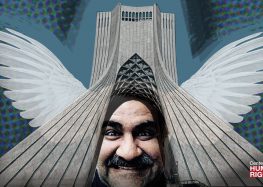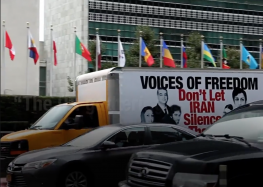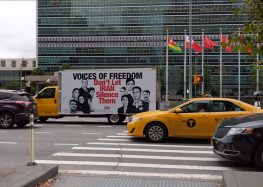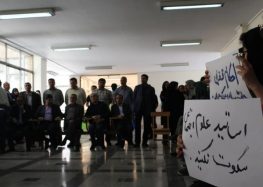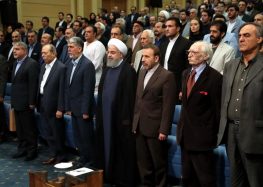Rouhani Government Suppresses Nuclear Deal’s Critics
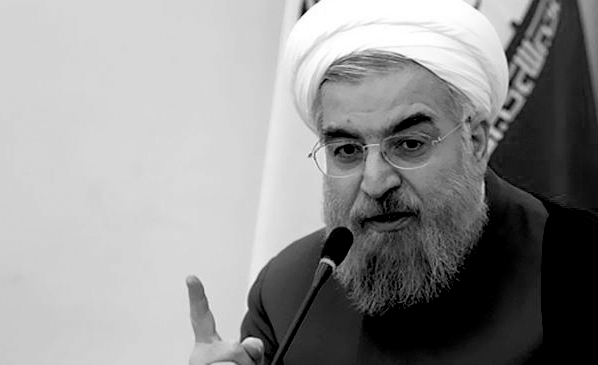
Despite high hopes among journalists and Iranian civil society that press freedoms would improve under President Rouhani, restrictions and censorship of the press have continued unabated during his two years in office.
August 5, 2015–Authorities in Iran have warned several conservative publications and banned one other, after these publications criticized aspects of the recently concluded nuclear agreement between Iran and world powers last month.
This recent move, undertaken by Iran’s Press Oversight Committee, a body comprised of officials from different government branches that monitors the media and can suspend any publication, shows that even publications near and dear to hardliners’ hearts fare no better than reformist ones regarding the denial of freedom of the press when they do not follow the official line.
“The government of Iran seems to feel the media is its own personal PR machine, and not an independent body,” said Hadi Ghaemi, Executive Director of the International Campaign for Human Rights in Iran. “This violates Iranian law and directly contradicts President Rouhani’s pledges regarding tolerance of criticism.”
The censures on August 3, 2015 followed a review carried out by the Press Oversight Committee of domestic media coverage of the nuclear negotiations. Two publications received warnings and one was punished for attacking the nuclear agreement: the ultra-conservative daily Kayhan and the website Raja News each received notices and the conservative weekly, 9 Dey was banned, according to the Iranian Students News Agency (ISNA).
The Press Oversight Committee’s decision followed a “very confidential” July 22, 2015, letter from Iran’s Ministry of Culture and Islamic Guidance addressed to all of Iran’s media outlets that was leaked on the Internet this week anonymously. In the letter, the Ministry directs the media not to publish any content criticizing or opposing the nuclear accord.
The letter directs the media to not publish “content that questions the achievements of the nuclear agreement,” or which “implies the government’s high officials have opposing views.” It explicitly encourages them to write and create content in favor of the nuclear agreement. Media are told they are not “allowed to cast doubt or create any skepticism or despair” about the nuclear negotiations.
The letter, signed by Hassan Mehrabi, the General Director of Iranian Press and News Agencies at the Ministry of Culture and Islamic Guidance, directs the media to avoid publishing news and analyses that “polarizes the society” or “gives the impression of contrast between the achievements of the negotiations with revolutionary, Islamic, and national values and ideals.”
The media are required in the letter “to respect and praise the Iranian negotiators,” and to emphasize “the unprecedented nature of the negotiations during the political history of recent decades,” and “the importance of the negotiating team’s courage combined with manners.”
The press is further directed to emphasize “the opposition of US extremists and Zionists to the agreement’s achievements,” and “analysis by foreign analysts and officials about Iran’s position in the negotiations and the defeat of the Zionists.”
The media are told to avoid “a critical or destructive” approach to the negotiations, and to only have “a descriptive and explanatory approach.”
Three state organizations in Iran, the Press Oversight Committee, the Supreme National Security Council, and the Iranian Judiciary, have a well established history of dictating to the press what they can and cannot report. Reformist newspapers and media have long been harassed, restricted, punished, and banned by hardline officials in the judicial and intelligence agencies.
Notable in the current censorship episode is the inclusion of the Ministry of Culture and Islamic Guidance, which is under the direct authority of President Rouhani. His administration’s compliance with media censorship when it is aimed at its own critics echoes hardliners’ behavior for decades.
On July 28, 2015, eighteen conservative Members of Parliament wrote a letter to Ali Jannati, Minister of Culture and Islamic Guidance, in which they claimed that “the Supreme National Security Council has never had a resolution about restricting the media and praising the subject of the nuclear agreement,” according to ISNA.
Despite high hopes among journalists and Iranian civil society that press freedoms would improve under President Rouhani, restrictions and censorship of the press have continued unabated during his two years in office.
Indeed, a number of major publications have been shuttered during Rouhani’s tenure. For example, in January 2015, the reformist Mardom-e Emrooz newspaper was banned after it published a photograph in support of the slain Charlie Hebdo cartoonists.
In April 2015, Zanan-e Emrooz, a magazine dedicated to women’s rights, was banned after it published an article about “white marriages,” a term used to describe co-habitation of couples outside of a registered marriage.
In February 2014, the independent centrist daily, Aseman, was shut down only five days into its establishment for publishing an article in which the Islamic “qisas” law (retaliatory death sentences for the murder of one’s kin) was described as “inhumane.”
Individual journalists have not been spared either. Arrests have continued, and dozens of imprisoned Iranian journalists have remained behind bars serving their full terms despite Rouhani’s campaign pledges to secure the release political prisoners and prisoners of conscience.

